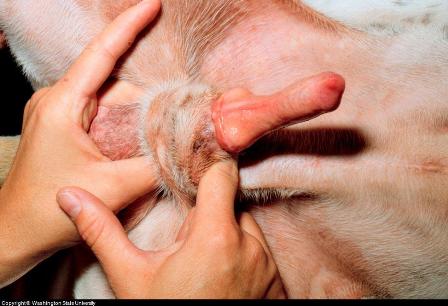Table of Contents
Summary:
Canine penile bleeding can be a symptom of a spectrum of dog health disorders in reproductive as well as urinary system. The bleeding can be from wounds to penis or prepuce. The reasons for wounds can include injuries, urinary tract infections, urinary tract calculi (stones), neoplasia, or cancerous and/or cystic growths in the urinary tract. The most common reason for dog bleeding from the penis is usually a prostatic disorder, which means that patient is suffering from a disease or disorder in the prostate gland.
Infections, enlargement of the gland and prostate cancer can cause bleeding from the penis. The condition is not always as simple as it seems, therefore it requires detailed clinical and laboratory diagnosis before any specific treatment is initiated. If you observe excessive penis licking or symptoms that aren't normal for your dog, see a veterinarian. Supportive measures such as natural remedies for prostatic health and urinary tract strength/health are usually very effective in reducing symptoms and improve prostate gland.
Overview of Causes
There are a number of reasons that could cause a dog to bleed from his penis. These include but are not limited to: infections, injuries, urinary tract calculi (stones), cancerous developments, cysts and most common of all, prostatic diseases (prostate gland).
The urinary tract is comprised of several sections. The canine penis is the terminal organ (end) of the urinary tract and blood may pass through it if any part of the urinary tract is affected by infection, tumors, cysts or calculi (stones). Bleeding from a dog penis is a common sign noticed in case urinary tract infections, cancerous developments and calculi (stone) accumulation. In the aforementioned causes of dog penis bleeding, it is common to notice blood when the dog is urinating.
Persistent bleeding from dog penis is commonly associated with prostatic diseases and problems with the dog prostate gland. Prostatic diseases such as Benign Prostatic Hyperplasia (BPH), prostatic abscesses, bacterial prostatitis, prostatic cysts and prostatic adenocarcinomas are common reasons for bleeding from a dog penis. These disorders are relatively common in intact dogs. Benign Prostatic Hyperplasia (BPH) is most common, where androgen or the hormone responsible for reproduction in male dogs is altered (stimulated or depressed).
The likelihood that urinary tract infection or prostatic diseases are the cause increase if you observe any changes the way a dog normally defecates or urinates. This includes straining or frequency of urination or defecation.
In the spectrum of causes, another reason for bleeding from the
penis in dogs can be blood clotting and other hemolytic disorders. These
are related to chronic circulatory deficiencies and blood disorders.

Source: Washington State University
Clinical Symptoms
A dog bleeding from penis is only a clinical feature of some other underlying health disorder, which is typically accompanied by other signs and symptoms. A dog with a urinary tract infection or calculi (stone) accumulation may show symptoms such as abdominal pain, urinary incontinence, painful urination, and blood mixed with urine. In cases of infection, a dog may bleed from the penis at the end of urination, while a dog with calculi in the urinary tract may urinate with fresh blood mixed in it.
Signs of persistent bleeding from a canine penis are mostly noted in prostatic diseases, where a dog has an enlarged prostate gland which can be detected by abdominal and rectal palpation (a veterinarian can feel the enlarged dog prostate by feeling the dog).
Canine prostate tumors and cysts and urinary tract infections that are in advanced stages of disease usually bleed persistently and a dog may show signs of bleeding from the penis. Common signs such as fever, anorexia, discomfort, penis stiffness, malaise (unease) and abdominal pain are usually also noted in urinary tract and prostatic bacterial infections, tumors and cystic developments. Bacterial prostatitis or inflammation of prostate gland is either acute or chronic, depending on the cause. Acute bacterial prostatitis may result in abscesses, while chronic form of it is most common in case of Benign Prostatic Hyperplasia (BPH).
In cases where a dog is suffering from circulatory deficiencies and blood clotting disorders, the patient may need to be diagnosed with special blood tests.
Diagnosis
If a dog's penis is bleeding, one must immediately see a veterinarian for a detailed examination and specific treatment. A veterinarian will record a detailed history of the condition and conduct a thorough examination.
The vet may need to perform several tests as well, since it is essential to detect a possible underlying disease in
order to make an accurate diagnosis. These initial tests can include a
urinalysis and urinary tract X-Rays. Infection, calculi and
prostatic disease can be clearly detected by these tests, but further confirmation may be needed in more complicated cases, including ultrasound and various advanced cytological and microbiological
examinations, in order to get accurate confirmation of the diagnosis.
Treatment for Canine Penile Bleeding
Once a clear diagnosis is made by a veterinarian, the underlying cause should be treated accordingly. Infections (either acute or chronic) requires a treatment with broad spectrum antibiotics and supportive drugs. Similarly, surgical procedures may be needed for more complicated cases of calculi accumulation (stones) and prostatic enlargement. Neutering a dog is one of most successful techniques used to treat symptoms of dog bleeding from penis.
Supportive as well as preventive measures are essential along with specific treatment prescribed by the veterinarian; natural remedies such as Prospet Drops and Kidney Support, herbal extracts and supportive therapeutics prescribed by a veterinarian may help in speeding the recovery from a case of dog bleeding from penis and simultaneously reduces chances of common secondary problems. The natural remedies if used early can improve the urinary and reproductive health, thus might contribute in improving prognosis.
Resource for Further Reading:
The Merck Veterinary Manual (11th Edition)
The Merck/Merial Manual for Pet Health: Home Edition
